The Ultimate 7-Day Gym Diet Plan
When it comes to nutrition, things can become overly complicated. However, one thing that is abundantly clear is that nutrition has a huge impact on the progress that is made in the gym. This article will highlight a number of considerations that must be made and applied in order to bring about substantial changes. In addition, it will also serve as a resource and highlight the nutrient rich foods that one should incorporate in their daily diet routine.
Foods To Add To Your Diet
There are three macronutrients that all play a crucial role in maintaining bodily functions and promoting changes in strength and composition – they are carbs, proteins, and fats. It is essential that we consume all three macros in ample quantities to optimize progress.
Carbohydrates
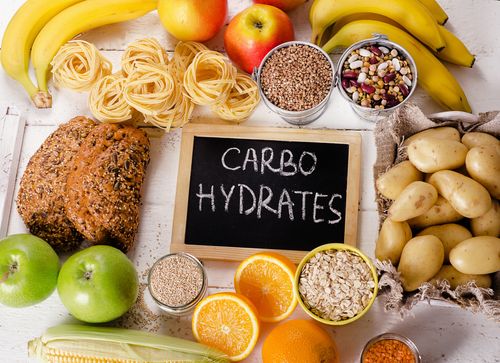
Firstly, carbohydrates are the primary source of energy for the body and therefore play the most substantial role in fueling exercise. There are two different types of carbohydrates – complex and simple. The names give an indication of the time taken to digest; complex carbs take a longer time period to digest than simple carbs.
Complex carbohydrates provide the body with prolonged slow-release of energy and have a great nutritional benefit. While simple carbohydrates provide the body with a short-term, fast releasing energy, they contain little nutritional value.
For this reason, you should look to primarily consume complex carbohydrates. Some foods to consider adding to your diet include whole-grains, oats, beans, nuts, fruits, and vegetables.
Protein
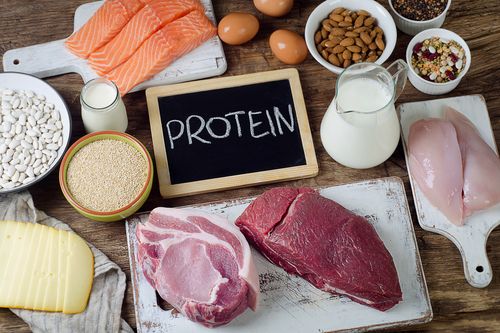
The majority of gym-goers will be well aware that consuming protein is important. The reason why protein is so important is that, it plays a key role in recovery and repair. During exercise, the body is exposed to strains and stresses which cause damage to occur to the muscles at a microscopic level. In order for the damage to be repaired, protein is needed. Without it, recovery periods will be extended and chronic fatigue may become a factor.
Protein is found most highly in animal produce such as lean meats, eggs & dairy. It can also be found in smaller quantities in foods such as seeds, nuts, legumes, beans, and soy.
Fats
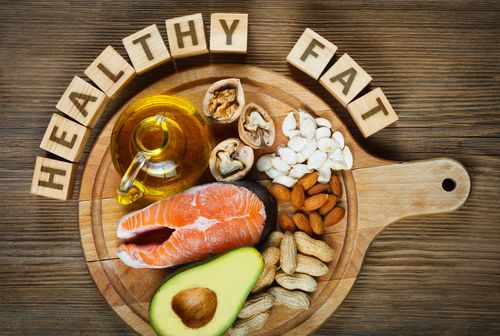
Fats are often incorrectly seen as the primary reason for fat gain. However, fats are not responsible for this and actually play a key role in the absorption and transport of nutrients. In addition, they can have a positive impact on heart health and hormone production.
While fats can have a positive impact on health, there are several types of fat – some of which are of greater benefit than others. While saturated fats are not as harmful as once believed, focus primarily on unsaturated fats. Unsaturated fat foods include avocados, seeds, nuts, peanut butter, fish (salmon, tuna, mackerel), oils (olive, peanut, sesame), and soy products (tofu, soy milk).
Pre-Workout Foods
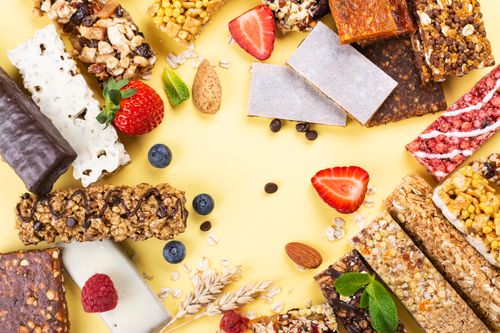
The focus with all pre-workout meals or snacks should be carbohydrates to provide the body with plenty of energy to last the full session. If energy levels are sub-optimal, then performance will suffer which will have a consequent impact on our rate of adaptation.
To prime the body for performance, focus on primarily consuming complex carbohydrates such as whole-grains, oats, beans, nuts, fruits, and vegetables. Be aware not to consume them just before the workout as they take time to digest. The recommendation is to consume complex carbs one to two hours prior to exercise to allow for full digestion.
From that point, focus on simple carbohydrates as they take less time to digest and provide the body with bursts of energy. It may even be recommended to consume some simple carbs during a workout to maintain energy levels and performance.
White bread, jam, granola, cereal, rice cakes, sports drinks, and fruit are all viable options for a pre-workout, energy-boosting snack.
While the focus should predominantly be on carbohydrates, it is also important to consume some protein prior to stepping into the gym. To support muscle recovery and growth, protein levels should be maintained at a high level throughout each day.
Post-Workout Foods
The purpose of post-workout nutrition is two-fold – to promote muscle recovery and replenish energy. Therefore, the focus should once again be on consuming good quality protein and carb foods.
As reflected on, the stress of training cause micro tears to occur to the muscles that must be repaired. Consuming protein will cause a process known as muscle protein synthesis (MPS) to occur which will begin the repairing process and prevent muscle breakdown.
There is a widely held belief that protein timing is extremely important for maximizing growth, however, a number of studies have indicated that total daily protein intake is of greater importance than the timing.
High-protein foods such as lean beef, chicken, pork, turkey, eggs, dairy, seeds, quinoa, and nuts should be prioritized. Protein supplements, like protein shakes and bars, can serve as a convenient tool for effectively boosting protein intake.
Carbohydrates should also form part of post-workout nutrition as the energy that has been expended during exercise must be replaced.
If possible, it is recommended to consume protein and carbs together as this will have the most pronounced impact on recovery by enhancing protein and glycogen (energy) synthesis. Often a ratio of 3:1 carb to protein is prescribed for optimizing recovery.
Ideal 7-day gym diet
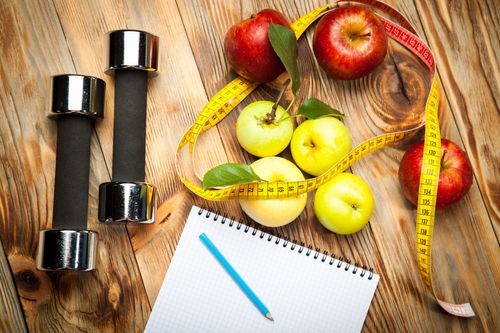
While calories and macronutrients are important, the ideal gym diet will be one that positively influences health. This is a diet that is rich in vitamins and minerals where all three macronutrients are consumed and nutrient-sparse foods are restricted.
Below you can find a 7-day gym diet guide:
Day 1
| Breakfast | Oats Banana Pancakes with Protein Shake |
| Lunch | Multigrain roti with palak chicken Avocado bell pepper salad |
| Pre-Workout Snack | Bananas |
| Dinner (Post-Workout) | Brown rice, peas paneer curry, sprouts vegetable salad |
Day 2
| Breakfast | Oatmeal with Greek Yogurt & Seasonal fruits Mango Juice |
| Lunch | Multigrain roti, fish curry, vegetable salad |
| Pre-Workout Snack | Toast with Jam |
| Dinner (Post-Workout) | Broken wheat khichidi, carrot raita, egg white, and vegetable salad |
Day 3
| Breakfast | Poached Eggs Whole Grain Toast Protein Shake |
| Lunch | Quinoa upma, chicken and broccoli salad |
| Pre-Workout Snack | Mixed Nuts & Dried Fruits |
| Dinner (Post-Workout) | Lean Beef and vegetable curry, brown rice, cucumber raita Baby Potatoes Chocolate Milk |
Day 4
| Breakfast | Oatmeal with Honey Apple Juice |
| Lunch | Grilled Chicken Salad Whole Grain Bread |
| Pre-Workout Snack | Toast with Peanut Butter |
| Dinner (Post-Workout) | Methi Chicken Brown Rice Broccoli Protein Shake |
Day 5
| Breakfast | Scrambled Egg Whole Grain Toast Smoothie |
| Lunch | Grilled chicken vegetable roti rolls Green Salad |
| Pre-Workout Snack | Mixed Nuts & Dried Fruits |
| Dinner (Post-Workout) | Chicken Stir Fry Spring Onion, Peppers & Broccoli Chocolate Milk |
Day 6
| Breakfast | Oatmeal Whole Grain Toast Orange Juice |
| Lunch | Whole Grain Chicken Wrap Black Beans, Peppers & Greek Yogurt |
| Pre-Workout Snack | Apple with peanut butter |
| Dinner (Post-Workout) | Keema bhurji and multigrain rotiLean Beef Mince Sweet Potato Protein Shake |
Day 7
| Breakfast | Oatmeal with Nuts Smoothie |
| Lunch | Whole wheat pasta with chicken and Green Salad |
| Pre-Workout Snack | Granola or Cereal |
| Dinner (Post-Workout) | Fish curry, boiled green peas salad Brown Rice Garden Peas Milk |
While the above guide will prove to be useful, be aware that when it comes to nutrition, everyone is different. Not only will physical attributes determine your nutritional requirements, the goals that you have set will also influence your diet.
For example, two goals that are extremely common are fat loss and muscle growth. To lose fat, calories must be restricted which will cause stored body fat to be broken down. For muscle growth, calorie intake must be increased to build significant muscle size as additional calories are required to accelerate the recovery process.
Macro-nutrient demands for both fat loss and muscle growth are similar. Firstly, protein intake should remain high for both. For muscle growth, protein is evidently required for building mass. The role of protein in fat loss is to prevent muscle tissue breakdown as far as possible.
As highlighted, carbohydrates are extremely important in energy and replenishment. As a result, those looking to lose weight and build muscle should get the majority of their calories from carb sources.
While consuming healthy fats is important, reducing the total amount of fat consumed helps to most effectively restrict calories. This is because, at nine calories per gram, fats contain the greatest number of calories per gram – protein and carbohydrates both contain four calories per gram.
Foods to Avoid

In the same way that proper nutrition has the potential to optimize performance and adaptation, improper nutrition can detrimentally affect progress and health. The following three foods should be avoided or limited as far as possible.
Trans fats are a type of dietary fat that has consistently been shown to impact health. While trans fats do naturally occur in small quantities, artificial trans fats are notoriously hazardous. Artificial trans fats can be found in baked goods, fast food, and many snack foods.
As mentioned, many simple carbohydrate foods do not have great nutritional value and contain a high amount of sugar. While they may be useful for a short term energy boost, consuming a large number of simple carbs can be detrimental.
Eating a great quantity of simple carbohydrates will spike blood sugar levels initially. However, very quickly, blood sugar levels will nosedive and can leave you feeling lethargic which is less than optimal for exercise and performance.
Although technically not a food, alcohol is a substance that should also be limited as far as possible. There is much research to indicate that alcohol negatively impacts recovery and may even interfere with the muscle-building process.
Nutrition Do’s and Don’ts
This final section will highlight a number of do’s and don’ts to help keep you on the right track with your nutrition.
Do’s:
– Consume all 3 macronutrients
– Ensure that you are eating a wide range of fruit and vegetables for comprehensive consumption of vitamins and minerals
– Primarily choose complex carbs over simple carbs
– Ensure that you are consuming protein regularly throughout the day
– Consume unsaturated fats over saturated and trans fats
– Moderate your consumption of produce that will negatively impact health and gym progress
– Maintain hydration levels
Don’t:
– Cut a macro-nutrient from your diet as all are required for specific functions
– Skip meals, especially in the lead up to or after a workout
– Eat a “heavy” complex carb meal too close to beginning a workout
– Rely too heavily on simple carbs to fuel performance
– Make poor nutritional choices for the sake of gaining calories
Summary
It is now clear that there are many different aspects of nutrition that must be considered when it comes to optimizing gym progress and to generally improve health. Following the guidelines and recommendations outlined in this article will allow you to make substantial changes to your performance and health.




